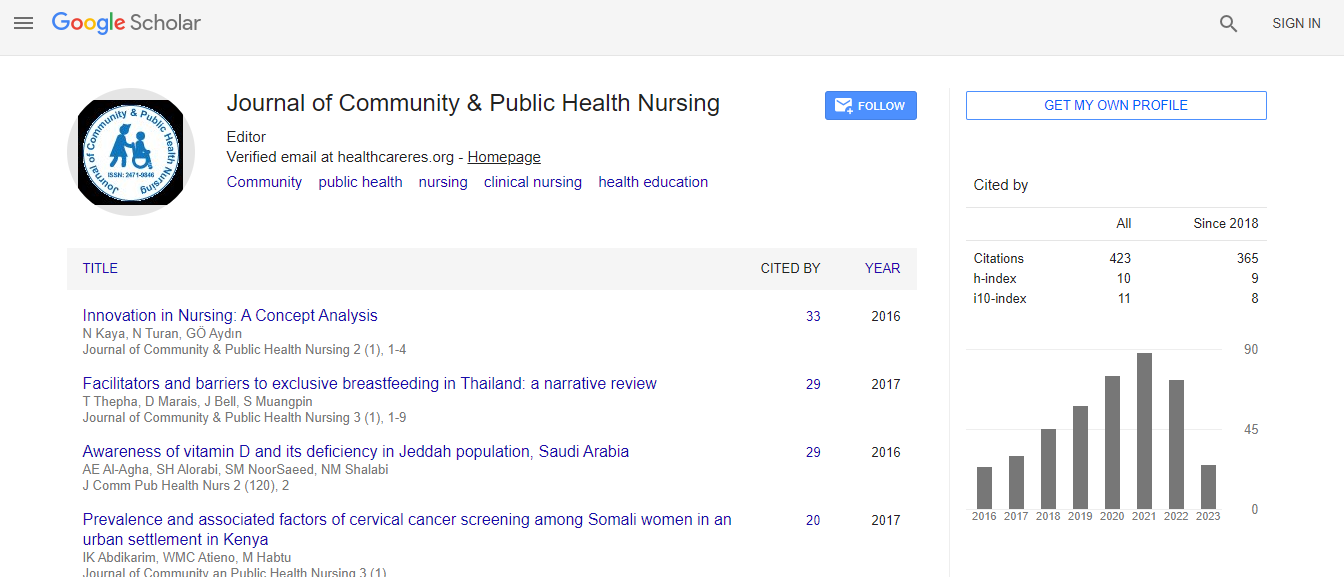Our Group organises 3000+ Global Conferenceseries Events every year across USA, Europe & Asia with support from 1000 more scientific Societies and Publishes 700+ Open Access Journals which contains over 50000 eminent personalities, reputed scientists as editorial board members.
Open Access Journals gaining more Readers and Citations
700 Journals and 15,000,000 Readers Each Journal is getting 25,000+ Readers
Google Scholar citation report
Citations : 739
Journal of Community & Public Health Nursing received 739 citations as per Google Scholar report
Journal of Community & Public Health Nursing peer review process verified at publons
Indexed In
- Google Scholar
- CiteFactor
- RefSeek
- Hamdard University
- EBSCO A-Z
- OCLC- WorldCat
- Publons
- Geneva Foundation for Medical Education and Research
- ICMJE
Useful Links
Recommended Journals
Related Subjects
Share This Page
An emerging trend in nursing education
World Nursing Congress
Krishna Choudhury
College of Nursing, NEMCARE Foundation,India.
ScientificTracks Abstracts: J Comm Pub Health Nurs
Abstract
Simulation has been used widely in the clinical exposure of nursing students and professionals. It is an emerging strategy for teaching, learning and evaluating clinical skills at different levels of nursing and midwifery education. It stimulates all the domains of learning in a student, i.e.: cognitive, psychomotor and affective domain. Literature review suggests that simulation in nursing and midwifery education is beneficial for both students and patients and can be used to train nursing students before exposing them to the clinical settings. Simulation based learning helps in increasing student├ó┬?┬?s responsibility and accountability towards clinical practice and it helps in improvement of overall quality of patient care. Benefits Simulations in education are somewhat like training simulations. They focus on specific tasks. It helps a learner to develop an understanding of the key concepts. Normally, a user can create some sort of construction within the micro world that will behave in a way consistent with the concepts being modeled. Conclusion Nursing education integrates theory and practice to help students develop cognitive, intellectual, affective (attitudes and beliefs), and psychomotor skills and prepare for professional life. Errors in real clinical settings threaten patient safety. Therefore, nursing students should perform primary nursing interventions over and over in laboratories and develop basic psychomotor skills before they enter clinical practice. Simulations replicate real-world situations in which nursing students can gain clinical experience without putting patients at risk. Simulations provide effective learning environments where nursing students can gain experience and develop collaboration, management, critical thinking, communication, clinical decision-making, and problem solving skills without harming patient. Keywords: Simulation, Education, Cognitive, Psychomotor, AffectiveBiography
Mrs. Krishna Choudhury is a Ph.D. Scholar from Srimanta Sankaradeva University of Health Sciences, Guwahati. She published a lot of papers and research works related to Nursing. Presently, she is working as an assistant professor from the College of Nursing, NEMCARE Foundation, Assam, and India.

 Spanish
Spanish  Chinese
Chinese  Russian
Russian  German
German  French
French  Japanese
Japanese  Portuguese
Portuguese  Hindi
Hindi 
